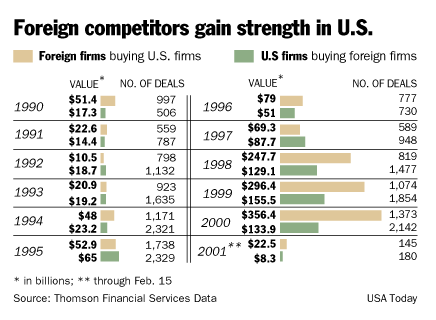USA Today
Although the U.S. economy has been the envy of the world — at least until recently — prosperity has failed to insulate companies from tough foreign competition.
 Europe’s Airbus Industrie has become a major supplier of U.S. airlines. It is nearing production of a 555-seat jet that analysts say will overnight end the domination of the Boeing 747 among jumbo jets. Europe’s Airbus Industrie has become a major supplier of U.S. airlines. It is nearing production of a 555-seat jet that analysts say will overnight end the domination of the Boeing 747 among jumbo jets.
 Xerox, once a symbol of American quality, is fighting for survival against Japanese competitors Canon and Ricoh. Xerox announced last week that it will sell half of its stake in Fuji Xerox to Fuji Photo Film, needing the $1.3 billion to help pay off its huge debt. Xerox, once a symbol of American quality, is fighting for survival against Japanese competitors Canon and Ricoh. Xerox announced last week that it will sell half of its stake in Fuji Xerox to Fuji Photo Film, needing the $1.3 billion to help pay off its huge debt.
 Finland’s Nokia, No. 1 in the mobile phone business, saw its market share rise from 31.4 percent to 33.9 percent in the fourth quarter, while the share of every other major player slid, according to Gartner Dataquest analyst Bryan Prohm. Motorola’s share slipped to 12.7 percent from 14.1 percent. Finland’s Nokia, No. 1 in the mobile phone business, saw its market share rise from 31.4 percent to 33.9 percent in the fourth quarter, while the share of every other major player slid, according to Gartner Dataquest analyst Bryan Prohm. Motorola’s share slipped to 12.7 percent from 14.1 percent.
At least one well-known company will soon be forced out of the mobile phone business, he predicted. "Motorola looks like a dry riverbed, all cracked up and waiting for rain," he said.
Lucent Technologies vs. Canadian Nortel Networks. The Baby Bells vs. United Kingdom’s Vodaphone. The list goes on.
Of course, there is another long list of U.S. companies that are winning globally such as General Electric and Wal-Mart.
But since 1998 foreign companies have been acquiring American companies at a pace that brings back memories, and anxieties, of 12 years ago when Japanese investors were acquiring U.S. real estate.
Last month, Netherlands media company VNU announced it had completed its $2.3 billion acquisition of American market research giant ACNeilsen. Nestle is trying to get Federal Trade Commission approval to acquire Ralston Purina, and the U.S. Nasdaq stock exchange may be the target of the London and Frankfurt exchanges.
That’s only a sample. Foreign companies have spent $900 billion in the past three years buying American firms, while U.S. companies have spent $418 billion buying foreign companies, according to Thomson Financial Securities Data. That’s a reversal of the trend that persisted for much of the 1990s.
What is driving this? It’s not that U.S. companies have become soft, economists say. Indeed, U.S. competitiveness has served to make the dollar so strong that U.S. exports are relatively expensive.
The consensus is that foreign companies have grown convinced that their U.S. competitors are so far ahead in digital, biotech and other new technologies that the only way to close the gap is to buy the knowledge. That means buying the company.
Additionally, the world has grown convinced that the mature economy here has made such productivity strides that it can grow faster than the traditional 2 percent to 3 percent without causing inflation. With the U.S. market capable of growing faster, any company that wants to be a global player has no choice but to have a strong U.S. presence, said David Wyss, chief economist for Standard & Poor’s.
There will always be domestic advantages that aid companies in certain industries. Making a phone call on a ground line has been relatively cheap in the United States. While there are benefits to such sound infrastructure, it has retarded the growth of mobile phone use.
In Finland, on the other hand, it is often cheaper to place a call on a mobile phone, and that has translated into faster growth and profits for Nokia, which has used this money to fuel global expansion.
Is all this foreign muscle-flexing cause for concern? The trade deficit is worrisome, economists say, but they say they haven’t lost much sleep over foreign ownership of companies that once had headquarters here.
Americans who work in the United States for foreign companies typically make about 10 percent more than those who work for U.S. companies, just as foreigners who work for U.S. firms abroad make 10 percent more than workers there, said Gary Hufbauer, senior economist with the Institute for International Economics.
The reason, he said, is that companies with the might to expand globally are the most productive, want the best workers and are willing to pay a premium.
"Should California be concerned that Bank of America is in Charlotte?" Wyss says. "Not much. You can still get a loan and credit card."
[back to top] |

